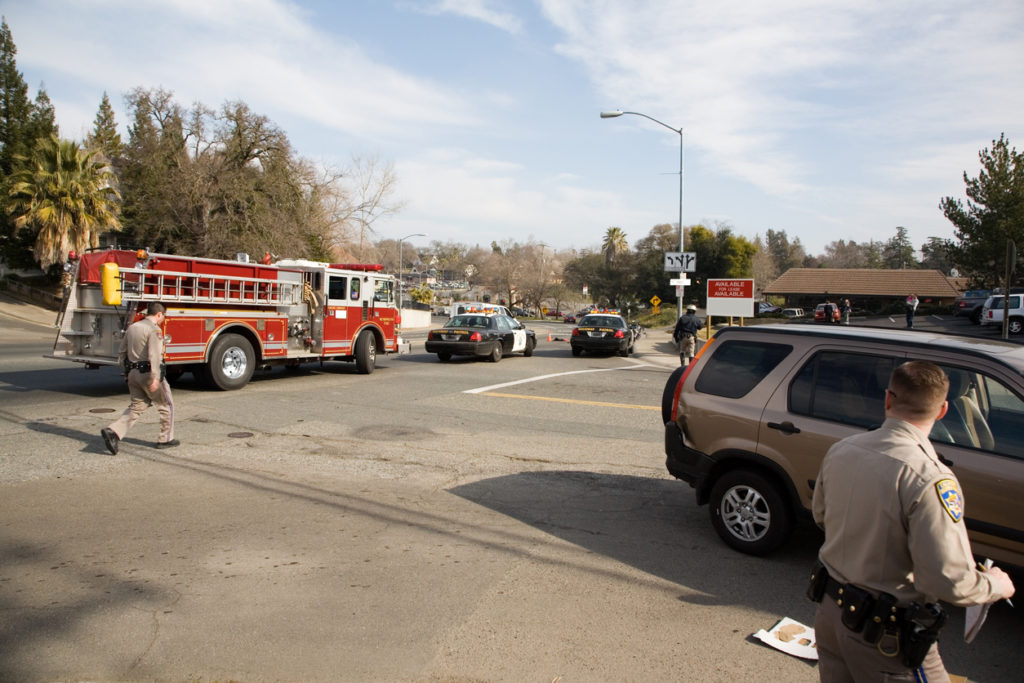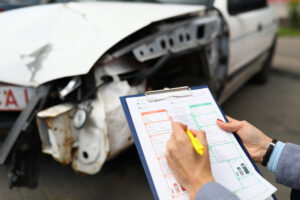Key Points:
- After a car accident, the at-fault driver’s insurance adjuster plays a critical role in determining the percentage of fault, the value of your claim, and the amount of your settlement.
- Once they have collected enough evidence to get a clear picture of the accident (i.e., who caused it and how much it cost), the adjuster will evaluate liability and damages and report their findings to the carrier.
- Whether the carrier pays the amount recommended in the report depends on factors such as the experience or status of the adjuster and the strength of the supporting evidence.
- Before you speak with the adjuster or agree to give a statement, consider whether your claim should be handled by a car accident attorney—any information you provide will be recorded and used in the investigation.
After you’ve been injured in a car accident, you’ll need to file an insurance claim to recover compensation for your damages. If the other driver’s negligence caused the accident, their insurance company has a duty to pay the costs. Once you’ve filed a claim with the at-fault driver’s insurance carrier, an adjuster is assigned to investigate your accident and determine how much the claim is worth.
The insurance adjuster works for the carrier, which means their job is to protect the insurance company’s interests—not yours. It’s in the best interest of the insurance company to pay as little as possible for claims to keep profit margins high, so the adjuster is focused on that goal during the investigation and settlement process.
However, insurance adjusters also want to avoid lawsuits because the cost of a trial and a high damage award from a jury can damage the carrier’s bottom line. If liability is clear and the victim can prove substantial damages, the adjuster is taking a big risk if they don’t settle the claim out of court. Thus, the insurance adjuster’s critical role is to determine each driver’s percentage of fault, assess the total cost of the accident (i.e., value of the claim), and negotiate a fair settlement.
How Insurance Adjusters Are Assigned to Accidents
No matter how high or how low the cost of your accident, the insurance carrier will assign an adjuster to handle the process after you file a claim. Typically, the adjuster is an employee of the carrier, though an insurance company might refer the claim to an independent, or third-party, adjuster if it lacks a local claims office in your area.

Regardless of the adjuster’s status (in-house or independent), their job is still to represent the interests of the at-fault driver’s insurance carrier in the claims process. Depending on the adjuster’s experience and status, their authority to settle claims on their own may be limited by a certain dollar amount. If your accident cost is higher than that amount, the adjuster will need to get approval from a manager or supervisor to reach a settlement. A complicated liability or damages claim is likely to be assigned to a more seasoned adjuster.
Keep in mind that aside from the adjuster representing the at-fault driver’s carrier, your own insurance carrier will assign an adjuster to assess the accident as well. Your insurance company has a duty to defend you if the other driver files a claim, so it’s important that your carrier’s adjuster conducts an investigation into whether you share blame for the collision.
How Does an Insurance Adjuster Evaluate an Accident?
During the investigation, the insurance adjuster follows certain steps to evaluate the strength and value of an accident claim. First, the adjuster reviews the insured’s policy to see what coverage is available. Next, the adjuster starts a claim file and begins collecting facts and evidence pertaining to the accident. For example, they’ll interview the drivers involved and any witnesses, review police reports, and consult with medical experts. They will likely ask for medical bills and records, vehicle repair estimates/bills, and any photo or video evidence you or others have gathered.
Once they have collected enough evidence to get a clear picture of the accident (i.e., who caused it and how much it cost), the adjuster will make a determination regarding liability and damages. Then they will report their findings to the carrier and explain which driver was at fault and why, including each driver’s percentage of liability if they share blame.
Because Georgia is a comparative negligence state, your damages are reduced based on your percentage of fault—as long as your share doesn’t meet or exceed 50 percent, in which case you aren’t entitled to any damages. If the adjuster decides you are entitled to damages, they will also determine how much your claim is worth and either offer that amount as a settlement (if they have authorization) or submit their recommendation for settlement to their claims manager. How Insurance Companies Respond to Investigation Reports from Adjusters
The way the insurance carrier responds to the adjuster’s investigation report depends on factors such as the experience or status of the adjuster and the strength of the supporting evidence. As discussed above, most insurance claims are assigned to in-house adjusters employed by the carrier.
A relatively new adjuster may have little experience handling claims and may not be authorized to settle high-value cases. Similarly, an independent adjuster hired by the insurance carrier may not be authorized to settle on the company’s behalf. If the liability finding is supported by evidence and your damages fall within the adjuster’s low authorization limit, the carrier typically pays the settlement amount recommended in the report.
However, if your claim is complex or expensive, it would likely be assigned to someone who is more experienced and trusted and has a higher authorization limit. In the event that your claim is assigned to a low-level or independent adjuster and this adjuster submits an investigation report recommending a high settlement amount, the carrier would probably take further steps before offering a settlement.
First, a claims manager or supervisor would review the report to determine whether the evidence supports the liability finding and damages. Depending on this determination, the manager might
approve the recommendation and pay the claim or transfer the case to a more senior adjuster for further investigation and/or negotiations with the claimant. If the facts indicate the carrier may be facing a significant payout or a higher likelihood of litigation, the insurance company’s attorneys typically become involved in settlement negotiations.
What to Do if an Insurance Adjuster Calls You
After the at-fault driver’s insurance carrier is notified about the accident, whether by the insured or through your claim, you will be contacted by the company’s adjuster—usually by phone. The adjuster will question you about what happened and ask for additional information about the accident, such as any evidence you may have collected or any witnesses who were present.
The adjuster may also ask to inspect your vehicle for damage or ask you to take it to a certified repair shop to have it inspected. You should know that any calls with the adjuster will be recorded and used as part of the investigation. Before you speak with the adjuster or agree to give a statement, consider whether your claim should be handled by an attorney. If there is clear evidence of liability in the police report and your injuries and expenses are minor, you may be able to obtain a fair settlement by dealing directly with the insurance adjuster.
However, before you make this decision, you should consider the following questions:
- Are your injuries serious?
- Is it possible you may suffer long-term effects from your injuries?
- Have your injuries interfered with your ability to work or could they in the future?
- Have your injuries affected your quality of life or could they in the future?
- Is it possible that you share blame for the accident or that the other driver may dispute fault?
If you answered “yes” to any of these, you should consult a personal injury attorney before giving a statement to the insurance adjuster. After your consultation, you can make an informed decision about whether you should negotiate with the insurance company on your own or let an attorney handle your settlement.
Keep in mind that apportioning liability can be challenging, and some types of damages can be hard to prove. An experienced attorney knows how to build a strong claim and negotiate for the full cost of the accident. In addition, insurance adjusters are more likely to offer fair compensation when dealing with a lawyer.
If you have legal representation, you should refer the adjuster to your attorney when they call rather than providing a statement. If you haven’t yet hired an attorney but intend to, you should only provide basic contact information when they call, such as your name, address, and phone number. Whether you choose to hire an attorney or deal with the carrier yourself, remember that the adjuster represents the insurance company and will dig for any information that favors their employer.

 1201 West Peachtree Street #2339 Atlanta, GA 30309+1-770-212-3795$0-$100000
1201 West Peachtree Street #2339 Atlanta, GA 30309+1-770-212-3795$0-$100000These are great representatives, which make up a great firm, and contribute to a great customer experience. Keep up the high quality work!

In theory, insurance adjusters are supposed to conduct an impartial investigation and evaluate their findings without bias to reach a fair settlement. After all, the purpose of an insurance policy is to protect the insured from the cost of an accident, and failing to offer a victim fair compensation can potentially leave the insured exposed to lawsuits.
In practice, however, the insurance adjuster’s job is to protect the carrier’s bottom line, and that means settling claims quickly for as little money as possible. To accomplish this goal, the adjuster must look for evidence and details that refute your claim or justify paying you less compensation. In other words, never trust an insurance adjuster to give you what you deserve.
Our Attorneys Know How to Work with Insurance Adjusters
Without an experienced attorney handling your claim, you risk not receiving the maximum amount of compensation you deserve. Our lawyers have represented car accident victims since 1993 and know how to communicate and negotiate with insurance adjusters. Call The Millar Law Firm today at (770) 400-0000 or contact us online to set up a free consultation with one of our attorneys.














